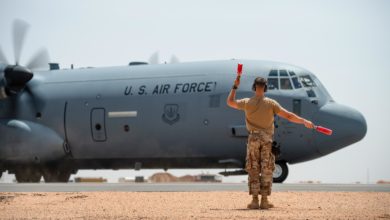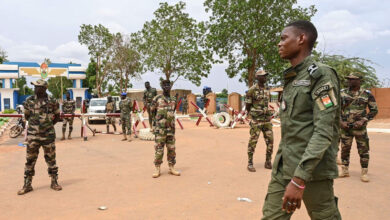EU pledges €138 million more to support G5 Sahel Joint Force
The European Union is to give €138 million ($155 million) more to support the G5 Sahel Joint Force, including its police component, a joint E.U.-G5 Sahel statement said, a week after Niger’s president called for sustainable U.N. funding or an an international coalition to fight insurgency in the Sahel.
Federica Mogherini, outgoing High Representative of the European Union for Foreign Affairs and Security Policy, met with the foreign ministers of the G5 Sahel countries – Burkina Faso, Mali, Mauritania, Niger and Chad – in Burkina Faso capital Ouagadougou on Tuesday, and a joint communique was published on Wednesday, July 10.
#security #development @FedericaMog in Ouagadougou for the 5th 🇪🇺 #G5Sahel 🇧🇫 🇲🇱 🇹🇩 🇳🇪 🇲🇷 meeting pic.twitter.com/8JX3gs2r4H
— Sabrina Bellosi (@sabellosi) July 9, 2019
Noting “renewed attacks by armed terrorist groups, violence perpetrated by so-called self-defense groups and recurrent inter-communal tensions,” the two sides called for a “determined and concerted response” to “prevent and contain any risk of escalation and destabilization of the region.”
They “reaffirmed their determination to work towards the operationalization of the Joint Force” and reiterated their commitment to “improve coordination between the Joint Force, the National Defense and Security Forces and international partners.”
The communique noted the “efforts of G5 Sahel states to mobilize domestic resources to deal with terrorism,” but also “stressed the importance of increased and immediate engagement in fragile areas to provide state services.”
It singled out “abuses committed by self-defense groups is a paramount condition to prevent the escalation of violence,” and stressed urgent need to dismantle the militias.
The two parties decided to consolidate their partnership, focusing on three priority areas: enhanced coordination by the G5 Sahel Permanent Secretariat; the definition of an integrated security and development framework; and to look for innovation in aid implementation, both in support for the Joint Force and in “development actions to respond quickly to the expectations of the population.”
It was in this context that the additional €138 million in support for the G5 Sahel Joint Force, including the police component, was agreed, the communique said.
“We agreed that we will go beyond the logic of deliveries and donor-to-recipient relationships to base our partnership on a true spirit of reciprocity of political, military, technical and financial responsibilities, based on a more direct support,” Mogherini said at a Tuesday press conference. “I want to emphasize this because probably the key word today has been the efficiency and focus of our efforts on the goals to be achieved.”
The G5 Sahel Joint Force has previously received €100 million in E.U. financial support, and the European Union said in July 2018 that it would finance the construction of a new headquarters in Mali, after its base in Sevare was destroyed in suicide bomb and gun attack later claimed by the al-Qaeda-linked Support Group for Islam and Muslims (JNIM). The Force Commander, Mauritanian General Hanena Ould Sidi said in September that G5 Sahel Joint Force headquarters will move to Mali’s capital Bamako.
Mogherini said on Tuesday that previous E.U. support to the Joint Force was a total of €115.6 million.
The bloc also funds the European Union Training Mission in Mali, which has a mandate until May 2020. Troops from 22 member states and five non-E.U. states work with both the Armed Forces of Mali (FAMa) and the G5 Sahel Joint Force. It has trained around 13,000 FAMa personnel.

G5 Sahel Joint Force funding still lacking
The G5 Sahel was launched in 2014 to improve cooperation on development and security, and the following year the five nations began work on the G5 Sahel Joint Force, a counter-terrorism initiative which was spearheaded by France, the colonial power in the region.
A June 2017 United Nations Security Council resolution called for international support, and the force launched a month later with a mandate to combat terrorism, transnational organized crime and human trafficking.
According to a March 2018 NATO report, the force aims to maintain seven battalions – two from both Mali and Niger, and one each from Chad, Burkina Faso and Mauritania. Each battalion consists of 550 soldiers plus 100 police or gendarmes, for a total of 4,550.
Troops will work alongside personnel deployed to the 4,500-strong France-led Operation Barkhane counter-terror mission in the Sahel, as well as the the U.N.’s third-largest peacekeeping mission, MINUSMA in Mali, which has about 14,000 personnel deployed.
Despite international pledges of hundreds of millions of dollars in financial support, funds have been slow to arrive, and lack of training, as well as poor equipment, have greatly undermined the G5 Sahel Joint Force initiative.

Calls for an international coalition to fight Sahel insurgency
In May, Burkina Faso again called for more support for the regional G5 Sahel Joint Force, and appealed to the United Nations Security Council to form an international coalition to help governments of the Sahel region fight insurgents.
Foreign Minister Alpha Barry said the G5 countries spend a large part of their budgets – 18 to 32% – on security, to the detriment spending on social services, but that despite this spending the security situation is deteriorating.
He said the Joint Force was then “on its feet” – 90% operational in the west, 74% in the center and 75% in the east – but still lacked heavy equipment needed to achieve full operational capacity.
He again called for a new U.N. support system to enable the Joint Force to transition into full operationalization.
Barry argued that the threat from extremists in the Sahel should be tackled with same determination shown by world powers in Iraq and Afghanistan, and that the international community should “consider creating an international coalition that would tackle terrorism on the territories of the G5 and in the entire Sahel.”
Last week, Niger’s President Mahamadou Issoufou echoed Barry’s calls in an interview with France 24 and RFI.
Using the example of the fight against Islamic State in the Middle East, Issoufou pointed to the presence of “the most powerful armies in the world, the United States, the Russians, the Iranians, the French, the Turks, etc,” noting that it took almost three years to overcome ISIS.
He said that the Sahel nations were increasingly “creating the conditions for a better involvement of partners in our fight,” also pointing to both the Multinational Joint Task Force in the Lake Chad basin and the decision at the last ECOWAS summit to soon “hold an extraordinary summit on security, very soon in Ouagadougou, in order to further pool operational and intelligence capabilities, at the regional level.”
“And we also plan to involve our external partners more closely in the fight against this threat, which does not only concern our region. It concerns the world,” Issoufou said. “The fight we are fighting, we are fighting for the whole world. Because if, one day, the Sahel is occupied by terrorists, Europe will be affected and the whole world will be threatened.”
Issoufou recalled the February 2018 conference to “mobilize financial resources at the international level” to finance the Joint Force to enable it to become fully operational.
“Fully operational means that it must be well equipped, including heavy equipment. This is currently underway. Much of the equipment has already been acquired,” he said, while also noting the force is awaiting more equipment from partners.
Issoufou again called for sustainable U.N. funding for the Joint Force, noting that “Niger will use its position as a non-permanent member of the Security Council, from 2020, to promote this position.”
He noted that the U.N.’s MINUSMA mission is “financed by the United Nations to the tune of $1 billion. We do not need $1 billion to operate the Joint Force. We only need to be allocated a portion of these resources to make the joint force operational.
“I do not despair that we will convince our American partners,” Issoufou said.
“Failing that, what we are proposing is that there should be an international coalition of countries to fight terrorism in the Sahel, just as there was a coalition against Daesh in the Middle East,” he said.

UN funding for the G5 Sahel
U.S. President Donald Trump’s administration has taken a harder line on U.N. funding in general, cutting contributions and pushing for cost-saving reforms. It is also seeking to streamline peacekeeping operations to reduce costs and make them more effective.
National Security Advisor John Bolton in December said the U.S. will seek to wind down long-running U.N. peacekeeping missions that do not bring long-term peace.
The U.S. has also resisted new U.N. funding for peacekeeping initiatives led by African organizations.
Late last year, an ambitious push by African countries to secure U.N. financing for future African Union-led peace missions faced strong resistance from the United States. U.S. Deputy Ambassador Jonathan Cohen said it was “premature” to decide on regular U.N. funding for African missions, citing ongoing questions about human rights and troop misconduct, and in December, the U.S. proposed 11 conditions for the financing of future African Union-led peacekeeping operations, pushing the deadline for a decision to December 2019.
In February, leaders of the G5 Sahel again called for regular U.N. funding and other aid to help tackle cross-border insurgency in the region.
Guterres has pledged to pursue support for the G5 Sahel Joint Force. The Secretary-General, as well as France, has lobbied for regular U.N. funding, but the U.S has pushed back against direct funding for the force.
Many Security Council members at the May meeting called for “predictable” U.N. funding for the Joint Force, but U.S. Ambassador Jonathan Cohen said bilateral assistance remains the best way to support the Joint Force, and expressed disappointment with calls for funding under Chapter VII of the United Nations Charter.
Despite almost doubling U.S. assistance to the G5 Sahel member states to almost $111 million, that support to Burkina Faso, Chad, Mali, Mauritania and Niger takes the form of “bilateral security cooperation efforts,” rather than direct funding for the joint force, a U.S. Africa Command spokesperson told The Defense Post in November.
Sahel states need more support to fight extremism, UN chief Guterres says












